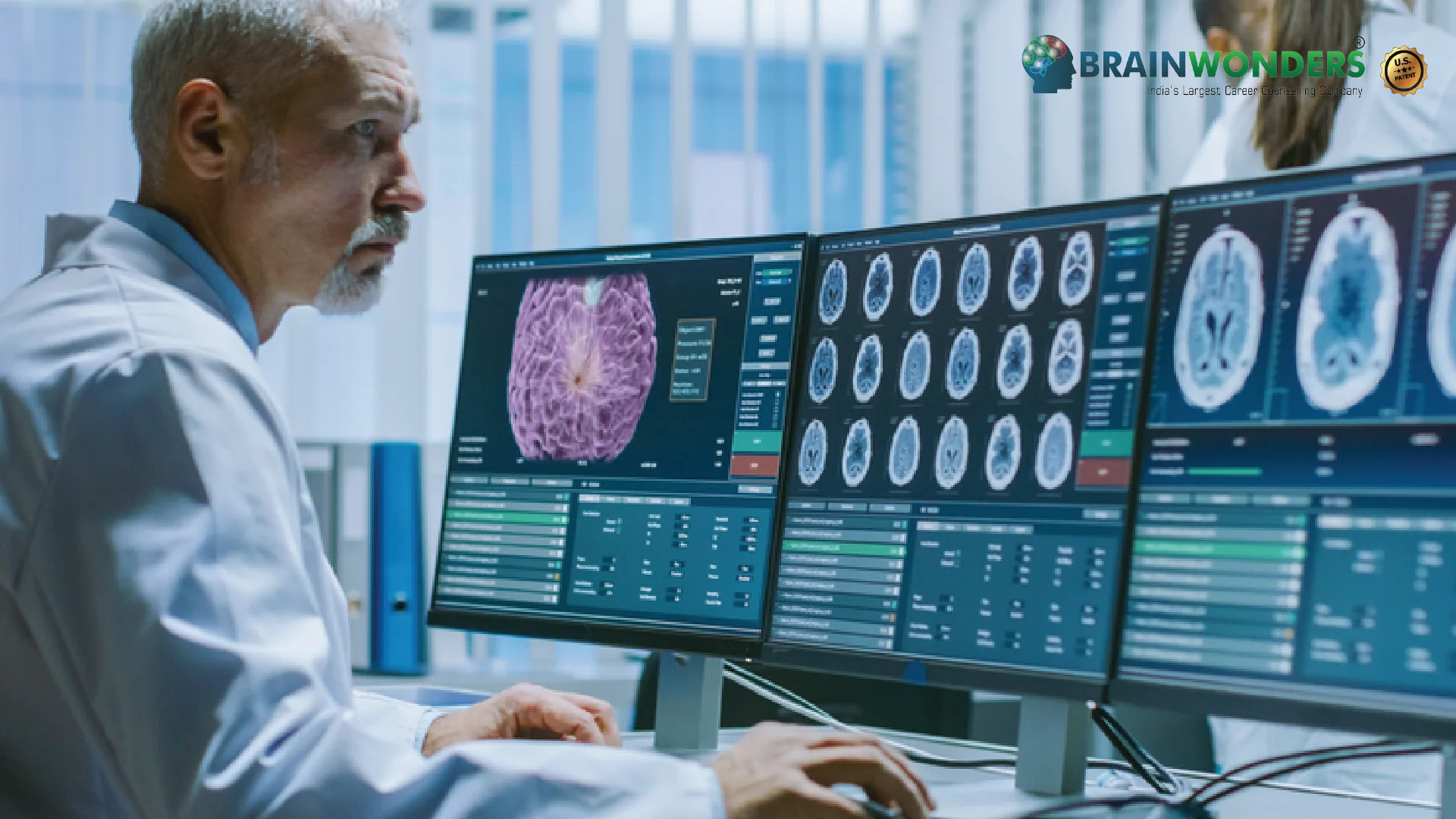How to become a Neuropsychologist and Clinical Neuropsychologist
Overview, Courses, Exam, Colleges, Pathways, Salary

Overview
Who is Neuropsychologist and Clinical Neuropsychologist ?
Neuropsychologists and Clinical Neuropsychologists are experts in the study of brain-behavior relationships. They assess, diagnose, and treat individuals with neurological disorders, using specialized tests and techniques to understand cognitive functions.
Neuropsychologists typically hold advanced degrees in psychology and specialize in evaluating brain-related issues. At the same time, Clinical Neuropsychologists work in clinical settings, focusing on conditions like traumatic brain injuries, strokes, and neurodegenerative diseases. They play a crucial role in designing personalized treatment plans, guiding rehabilitation efforts, and contributing to research in the field. Overall, these professionals provide valuable insights into how the brain influences behavior and contribute to improving the lives of individuals with neurological conditions.
Typical day at work
What does Neuropsychologist and Clinical Neuropsychologist do?
Neuropsychologists evaluate and treat people with various types of nervous system disorders. They work closely with doctors, including neurologists. People are commonly referred for neuropsychological evaluation after an injury, illness, or disease affects the brain or nervous system. If physicians can’t identify the cause of a condition, a neuropsychologist can help determine a diagnosis. If a diagnosis is already known, an assessment can still be helpful. A neuropsychologist can help determine what impairments a patient might have and how severe they are. Although physicians are able to look at scans and images of the brain, pictures do not always show how well the brain is working and to what extent the brain has been injured. By doing neuropsychological testing, physicians are able to see how the brain is working, and this in turn will help them understand how and why the patient's abilities and temperament have changed. Once the patient has completed the evaluation process, their health care provider will be able to give recommendations that will help them and their family develop a plan for getting better.
Symptoms that may call for a neuropsychologist include:
· memory difficulties
· mood disturbances
· learning difficulties
· nervous system dysfunction
Examples of conditions neuropsychologists evaluate and treat are:
· Stroke - a stroke can affect behaviour, thinking, memory, and other brain functions. An evaluation helps determine the degree of stroke impairment.
· Parkinson’s disease - Parkinson's disease can cause several neurological problems. An exam can provide a baseline in order to determine disease progression and decreased function.
· Alzheimer’s disease - Alzheimer’s disease and other types of dementia can interfere with memory, personality, and cognitive abilities. An exam may be able to identify Alzheimer’s in its early stages.
· Traumatic brain injuries - Injuries to the brain can cause a wide variety of symptoms. A neuropsychologist can help determine how an injury affects functions like reasoning or problem solving skills.
· Learning disabilities - There are many types of learning disabilities. A neuropsychologist can help determine the type of learning disorder in order to develop a treatment plan.
Abilities and Aptitude needed
What are the skills, abilities & aptitude needed to become Neuropsychologist and Clinical Neuropsychologist?
Neuropsychologists have distinct personalities. They tend to be investigative individuals, which means they’re intellectual, introspective, and inquisitive. They are curious, methodical, rational, analytical, and logical. Some of them are also social, meaning they’re kind, generous, cooperative, patient, caring, helpful, empathetic, tactful, and friendly.
Salary
Salary for Neuropsychologist and Clinical Neuropsychologist?
- Entry-Level Annual Salary: Entry-level Neuropsychologists and Clinical Neuropsychologists can expect an annual salary ranging from INR 3,00,000 to INR 6,00,000 or more.
- Experienced Annual Salary: Experienced professionals with several years of practice and specialization can earn an annual salary ranging from INR 6,00,000 to INR 15,00,000 or more.
- Location Influence: Metropolitan areas and regions with a higher demand for neuropsychological services may offer better compensation.
- Type of Employer: Working in hospitals, research institutions, universities, rehabilitation centers, or private clinics can impact the salary.
- Education and Specialization: Advanced degrees (such as a Master's or Ph.D.) and specialized training can contribute to higher salaries.
- Clinical vs. Research Roles: Neuropsychologists may work in clinical settings, research, or a combination of both, which can influence their earning potential.
- Government vs. Private Sector: Government institutions and academic positions may have different compensation structures than private sector roles.
Pathways
How to become an Neuropsychologist and Clinical Neuropsychologist?
Entrance Exam
Entrance Exam for Neuropsychologist and Clinical Neuropsychologist ?
· Amrita Vishwa Vidyapeetham All India Entrance Examination
· Manipal University MA Clinical Psychology Entrance Exam
· Delhi University M.A Applied Psychology Entrance Exam
· Annamalai University M.Sc Clinical Psychology Entrance Exam
· National Institute of Mental Health and Neuro Sciences Entrance Exam
Courses
Which course I can pursue?
Best Colleges
Which are the best colleges to attend to become an Neuropsychologist and Clinical Neuropsychologist?
Industries
Which Industries are open for Neuropsychologist and Clinical Neuropsychologist?
Neuropsychologists and Clinical Neuropsychologists can find opportunities across various industries where their expertise in understanding brain function and behavior is valued. Some of the sectors open to these professionals include:
- Healthcare Institutions: Hospitals, medical centers, and clinics employ neuropsychologists and clinical neuropsychologists to assess, diagnose, and treat patients with neurological disorders, brain injuries, and cognitive impairments. They contribute to patient care teams alongside neurologists, psychiatrists, and other specialists.
- Research and Academia: Universities, research institutions, and academic settings provide opportunities for conducting research, publishing studies, and teaching courses related to neuropsychology. These professionals contribute to advancing scientific knowledge and training the next generation of psychologists.
- Rehabilitation Centers: Neuropsychologists play a crucial role in rehabilitation centers, helping patients recover cognitive functions after brain injuries or strokes. They design and implement cognitive rehabilitation programs tailored to individual needs.
- Pharmaceutical and Biotechnology Companies: These industries may hire neuropsychologists to assist in clinical trials, studying the effects of medications and treatments on cognitive functions and behavior.
- Mental Health Facilities: Neuropsychologists can collaborate with mental health professionals to assess cognitive aspects of psychological disorders, such as the cognitive effects of depression, anxiety, or schizophrenia.
- Aging and Geriatric Care: As the population ages, there is a growing need for professionals to assess and manage cognitive changes associated with aging, dementia, and neurodegenerative diseases in elder care facilities.
- Pediatrics and Developmental Disorders: Clinical neuropsychologists specializing in pediatric care work in children's hospitals, clinics, and schools. They assess and provide interventions for children with developmental disorders, learning disabilities, and neurological conditions.
- Forensic Psychology: In legal settings, neuropsychologists may serve as expert witnesses to provide insights into how brain function may have influenced criminal behavior or competence to stand trial.
- Government and Public Health: Government agencies focused on disability services, veterans' affairs, and public health may employ neuropsychologists to contribute to policy development, assessment, and intervention programs.
- Sports and Performance Psychology: Neuropsychologists can work with athletes to assess and manage sports-related concussions and optimize cognitive performance and mental resilience.
- Consulting and Private Practice: Some neuropsychologists and clinical neuropsychologists establish their private practices, offering assessment, counseling, and intervention services to individuals seeking to improve cognitive function and well-being.
- Technology and Gaming Industry: With the rise of digital health and cognitive training apps, neuropsychologists may collaborate with technology companies to develop and validate cognitive enhancement and assessment tools.
internship
Are there internships available for Neuropsychologist and Clinical Neuropsychologist?
Internships for Aspiring Neuropsychologists and Clinical Neuropsychologists:
- Hospital Internships: Many hospitals offer internships in their neurology or neuropsychology departments. Interns may participate in patient assessments, observe diagnostic procedures, and engage in treatment planning under the guidance of experienced neuropsychologists.
- Research Internships: Research institutions and universities often provide internships for individuals interested in gaining research experience in neuropsychology. Interns may assist with data collection, literature reviews, and analysis of research findings.
- Rehabilitation Centers: Interning at rehabilitation centers allows aspiring clinical neuropsychologists to work with patients recovering from brain injuries or strokes. This hands-on experience can involve cognitive rehabilitation, therapy sessions, and patient assessments.
- Private Practices: Some private practices specializing in neuropsychology offer internships, allowing interns to observe assessments, treatment sessions, and administrative aspects of running a clinical trial.
- Pediatric Settings: Internships in pediatric hospitals or clinics provide exposure to assessing and treating children with developmental or neurological disorders, offering valuable experience for those interested in pediatric neuropsychology.
- Elder Care Facilities: Internships in facilities caring for the elderly can provide insight into age-related cognitive changes and neurodegenerative disorders like dementia and Alzheimer's.
- Community Mental Health Centers: Interns can work with diverse populations, gaining experience in assessing cognitive and emotional functioning in individuals with various neurological conditions.
- Government Agencies: Some government agencies, such as those focused on veterans' affairs or disability services, may offer internships to work with individuals with neurological and cognitive challenges.
- Nonprofit Organizations: Nonprofits dedicated to neurological health often provide internship opportunities for involvement in awareness campaigns, support groups, and educational initiatives.
- Online Platforms: Virtual internships or telehealth opportunities are becoming more prevalent, allowing interns to engage in remote assessment, counseling, or research activities under supervision.
Career outlook
What does the future look like for Neuropsychologist and Clinical Neuropsychologist?
The Bureau of Labor Statistics (BLS) does not provide estimates of job growth specifically for neuropsychology. However, the agency predicts that the overall field of psychology will grow at an average rate of 11% through 2022. When examining the possibilities for job growth in the neuropsychology sector, one can assume it will be steady at the very least, and optimistically very strong. Since 2 million people each year suffer a brain injury, demand for qualified neuropsychologists should remain steady. However, with increasing interest in the brain and how it works, as well as rapidly improving imaging technologies, demand for workers in the field of neuropsychology could see more rapid growth over the course of the next 10-20 years. Growing numbers of older adults, who are more susceptible to Alzheimer’s, dementia, and stroke, will also fuel the need for more neuropsychologists.




.webp)


